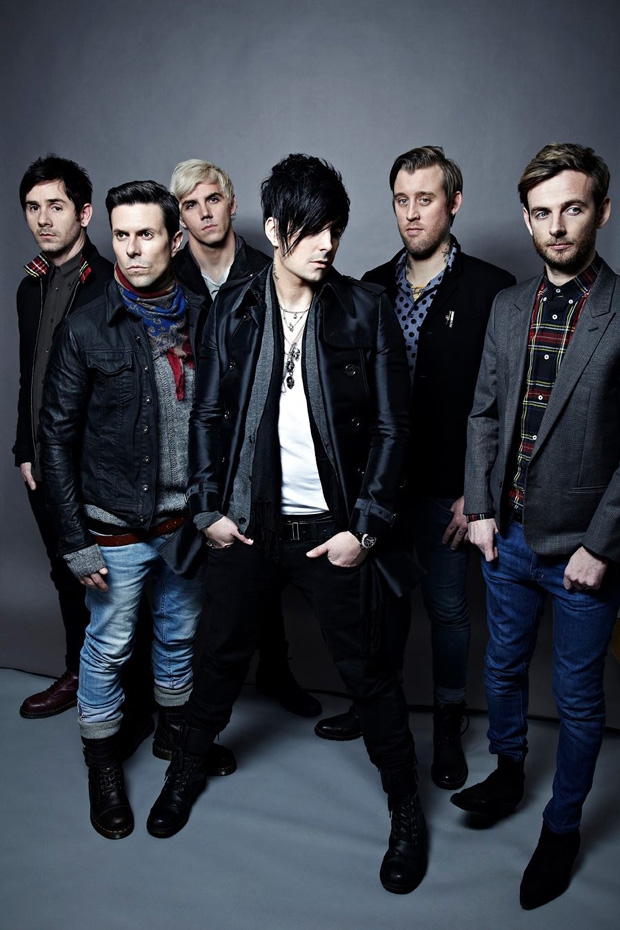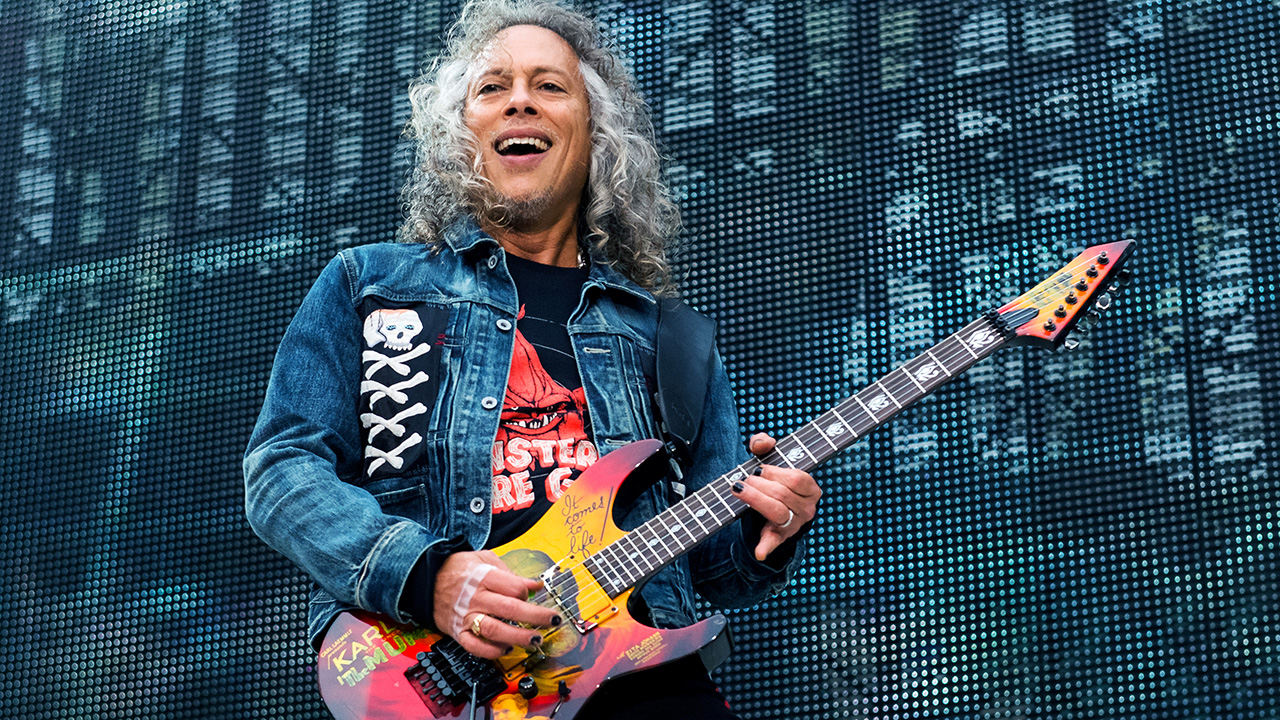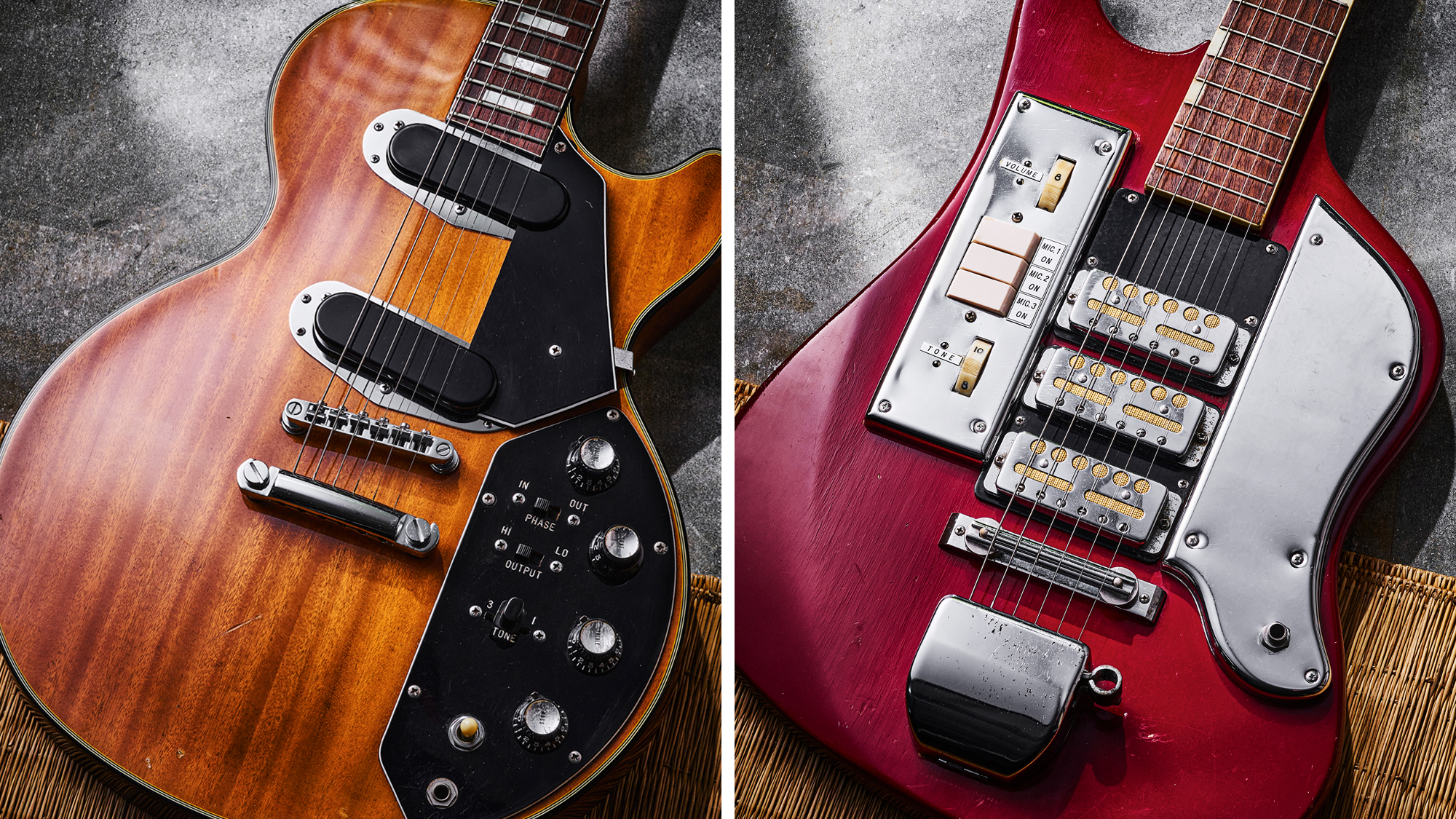Interview: Lostprophets Guitarist Mike Lewis Discusses ‘Weapons’ and Warped Tour 2012

It's been roughly six years since Welsh band Lostprophets last set foot on U.S. soil.
Now, on the heels of the June 19 release of their new album, Weapons (Buy it on iTunes), on Fearless Records, Lostprophets fans are about to get a much-needed dose of the band on the second half of this year’s Warped Tour, which kicks off July 12.
GuitarWorld.com sat down with Lostprophets guitarist Mike Lewis who discussed the band's writing process, his take on music industry trends and what fans can expect from them on Warped Tour.
GUITAR WORLD: Your new album, Weapons. has been out in the UK since April and was released here on June 19. How have fans taken to the band’s musical progression since 2010's Betrayed?
I think a lot of people are really into it. A lot of people have said it has kind of gone back a little bit more toward the Start Something sound, which a lot of people are really excited by. It was something that kind of happened by accident as well. When we wrote this record, we didn’t plan what it was going to sound like and just let it happen organically. It just turned out that way, so I think a lot of people are big into that.
In what specific ways would you say your personal style of writing and playing has developed since your debut full-length, Start Something, and how can we hear that on the new album?
Oh my god. I think that album was a very naïve album. We really had no idea what we were doing. We were just throwing songs together and not really thinking about song structures per se, you know? I guess we’ve learned how to write songs since then, if that makes sense. We learned a lot about structures, what works, how to build a song, dynamics, and all of that which is something that maybe doesn’t happen naturally when you begin a band.
Get The Pick Newsletter
All the latest guitar news, interviews, lessons, reviews, deals and more, direct to your inbox!
The five of us have been writing songs together for close to fifteen years now, and our drummer has changed, but you get to know each other and read each other so much. When we’re jamming, it’s almost like you know where Stu is going to go on the bass. When we’re playing, I am more of a rhythm guitar player, and Lee is more of a lead guitar player, and we know what our roles are. We are just very comfortable with each other now.
You began playing bass for Lostprophets in 1997 and switched to rhythm guitar in 1999. Did playing bass have an effect on how you play guitar or how you hear the structures in your songs?
It was actually the other way around, to be honest. I was a guitar player first, and I played guitar in a hardcore band. I’ve known Ian and Lee forever. When their old band broke up, they started Lostprophets. They didn’t have a bass player, so I was like, “Oh, I can play bass.” Being a guitar player — that’s going to sound really disrespectful to bassists [laughs] — but generally, if you can play guitar then you can play bass, or vice versa.
When I played bass in the band that was a very different approach to me. I was not the best bassist in the world, being a guitar player, and we knew Stu who was very good at bass, so Stu came in and played. I switched back to guitar, and we were only a four-piece at that point in time. We kind of decided that we needed another guitar, so that’s when we decided that I would play rhythm guitar. I love bass, and I think that bass and guitar are two very different instruments with very different ways of playing.
What is currently influencing the band, and who have been some of your personal musical interests over the years?
I would think that for the new album we kind of tried to — it’s a difficult thing to do — but not think about any influences. I think that was one of the only conscious things that we thought about. We just wanted to get in and write a Lostprophets record.
Once you’ve written four albums, and we were writing our fifth, you kind of get to that point. You think about that point when you’re first starting a band and how you’re developing and using other influences to help you, but I think that as we’ve progressed, we kind of know how we sound and have our own way of working. With this record we just wanted to be Lostprophets. We brought in some different elements from electronic influences, but it was really only on one song.
You guys have been a band for about 15 years, and you are being featured on this year’s Warped Tour. Are you at all hesitant to play older material in light of the new release, or can fans expect some old favorites?
It is our first time on Warped Tour, but we’ve seen a lot of bands on festivals. When you see a band on a festival, you want to see them play the hits, you know? I want to see a band play the songs that I know. On Warped Tour, we have a half-hour slot, so we just want to get out there and play the songs that people know—maybe people haven’t picked up the new record yet, but maybe they have some of our earlier ones.
We’re going to go out there and play songs from all of our records, so people can expect “Last Train Home” and “Rooftops.” People are going to want to hear those, and we want them to come out and have a good time with us when they see us, so we’re definitely going to play the crowd favorites.
You have some tour dates coming up, aside from Warped Tour, which take place in Europe and in the UK in the fall. When can we expect another North American tour — perhaps a headliner?
We’re only on the second half of Warped Tour, so we’re really only going to be playing on the East Coast and a little in the Midwest. I think we’re going to try and work it out to do some California shows and some West Coast shows in August. We’re hoping to come back in the fall and maybe do a tour — it’s not worked out yet, but that’s what we’d like to do if we can make it happen. Fingers crossed. We haven’t toured in America since 2006, so we’re all really excited.
What gear did you use to record the album to achieve that “big anthemic rock” sound? Are you an effects junkie?
Our producer, Ken Andrews, wanted us to use all of our own gear. Sometimes you go into the studio and the producer’s got a wall of amps that he wants you to use and whatever — Ken was really kind of keen on us using our own amps. I think it’s a little different now as well. We’ve got five albums under our belt, so I think we kind of know what sounds good.
I used an Orange Thunderbird head for my main distortion sound, and then a Blackstar Artisan 30 for all of my clean stuff, and I used it for a semi-distortion sound as well. I used a Blackstar HT-Dual pedal, which is like a distortion and sort of tube screamer-ish pedal. I have a Gibson Les Paul that sounds great — it’s not a vintage one or anything crazy like that. On a couple of parts I used a hollow-body Rickenbacker.
Other than that, it was mainly my Les Paul through my Thunderbird. I’m not crazy on effects. Lee is Captain Effects. He actually just scaled his pedal board back down a little bit. It was getting out of control [laughs]. He uses a lot of delays, chorus and phasers. He does a lot of stuff with filters as well. I’m more of just a straight-ahead guitar player. I mainly just plug a guitar into an amp. I grew up listening to thrash metal and punk rock [laughs].
What is your take on the current rock music scene, especially that among the bands on Warped Tour 2012? What do you envision to be the next step in musical trends?
I don’t know. Obviously it started a while ago, but everything is just so cross-genre these days. Dubstep is huge now, and artists like Skrillex are obviously attracting a massive rock crowd as well. We just did a UK tour, and we brought along a dubstep act as our support, and kids loved them.
They had an immediate reaction from the kids who came to the show. I’d never seen anything like it. For a band that nobody in the audience knows, they had the place going crazy within a couple of minutes. It was nuts to see. It was kind of neat to see, because obviously it was a rock crowd going crazy for this dance music, which I personally think it awesome.
I listen to everything from '60s soul music to grindcore. That’s just the way it’s going now. Boundaries are coming down all over the place, and sometime it’s done very well, and sometimes it’s done very badly, quite unfortunately [laughs]. I think that the way it’s going now, you know? People are just trying to do something a little different, and it’s cool because I think people are becoming more and more open-minded to that, which is great.
Keep up with the band at their Facebook page and official website. Buy Weapons on iTunes here.
“You run scales so when inspiration and instinct kicks in you're able to keep up with it”: Larkin Poe's Rebecca Lovell explains her “hunt and peck” approach to guitar solos – and how scales can make all the difference
“I wanted to play more, and it was inappropriate with Eric or Roger. I was not the lead guitarist, and I wanted to be”: Clapton, Waters, Satriani and me – Andy Fairweather Low on his greatest collaborations and finally taking center stage










